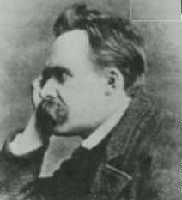
“God is dead.”
With these words, Friedrich Nietzsche ensured his place among the most memoriable philosophers in history. This phrase ranks alongside Descartes’ “I think, therefore I am” as one of the most important in western philosophy.
But, Nietzsche’s statement represents only a small portion of his overall philosophical effort. It’s outlandish nature continues to draw far more emphasis to it than perhaps Nietzsche himself would have desired. The German philosopher’s writings covered a wide-range of subjects, Christianity being but one area struck by his powerful “hammer.”
Nietzsche wrote about Greek philosophy, the nature of “Truth” and “Knowledge,” modern values and morals, what it means to be human, and about transcending our humanity to become the “Ubermensch.” He developed the concepts of the “Will to Power” and of “Eternal Recurrence,” both of which have been influential and hotly debated in contemporary philosophy.
Much of what he espoused has been criticized as harsh, pessimistic, and nihilistic. But, there is much in his work that is of an inspirational nature. Many of Nietsche’s own criticisms and insights into the modern world have proven to be penetrating and even prophetic.
Among his critics, Irving Zeitlin writes, echoing Dostoevsky's Crime and Punishment, "...if God is dead, everything is premitted. The danger of this kind of moral nihilism Nietzsche nowhere takes into consideration." Zeitlin, like many others, points out that clearly the "death" of God has had a disasterous effect on the twentieth century.
While I do not denie that the demise of God-like authority among the masses of western civilization (and, indeed, in communist Asia) has led to a certain human irresponsibility in many cases, this is hardly due to Nietzsche's thought or influence. Rather, Nietzsche's brilliance lies in the fact that he understood these processes long before they became predominant. In fact, to his credit, Nietzsche understood nihilism as a growing force within humanity.
"What I relate," he wrote in The Will to Power "is the history of the next two centuries. I describe what is coming, what can no longer come differently: the advent of nihilism. This history can be related even now; for necessity itself is at work here. This future speaks even now in a hundred signs, this destiny announces itself everywhere; for this music of the future all ears are cocked even now. For some time now, our whole European culture has been moving toward a catastrophe, with a tortured tension that is growing decade to decade: restlessly, violently, headlong, like a river that wants to reach the end, that no longer reflects, that is afraid to reflect."
Nietzsche wrote these words about 26 years before World War One. Which was followed by World War Two. He intimately saw these catastrophies before virtually anyone else. And he saw them not just as military events, but as symbolic forces or sweeping cultural affairs that forever altered everything that stood previously, including the authority of a "God."
But, we should not despair. There is the other part of Nietzsche's message. The inspirational quality of his work. As Joseph Campbell points out throughout Creative Mythology, Nietzsche is an active nihilist. He believed not in "a decline and regression of the power of the spirit," but rather he advocated "a heightened power of the spirit" despite the death of God. Campbell concludes that Nietzsche's philosophy represents many qualities of a modern human being living forcefully with the "dissolution" of the "mythogenetic zone." In other words, for Campbell, Nietszche realizes that the individual is now on his own as far as creating meaning in his or her life, whereas such meaning in the past came moreso in collective forms like mythology and religion.
As Nietzsche himself puts it: "Attempts to escape nihilism without transvaluing earlier values only bring about the opposite of escape: a sharpening of the problem."
We live in a time when new values are emerging. Nietzsche was (is) the harbinger of these emerging values. And which is more relevant today, the person who seeks to reconnect the past with the future, or the person who knows all bets are off where the "truth" is concerned and makes peace with the Self within that accepted chaos?
Bill Curry's Nietzsche Page: Presents the philosopher's ideas by primary category. Lots of links to other NietzStuff.
The Nietzsche Page at USC: An In-depth page devoted to Nietzsche scholarship as well as the philosopher's writings. Provides a link to The Journal of Nietzsche Studies. Features "Also Sprach Zarathustra" Theme Music.
Pirate Nietzsche Page: Writings by him, about him, links, and several forums.
Nietzsche Campfire Chat: A messageboard devoted to all things Nietzsche. A thriving cybercommunity composed of those outside "the herd."
Katharen Eiermann's Nietzsche Page: Devoted to the philosopher's life and times with plenty of insights into his work in the form of studt guides and helpful analysis.
Friedrich Wilhelm Nietzsche: A biography and commentary on his place among 20th century philosophers. Includes a detailed chronology of his life.